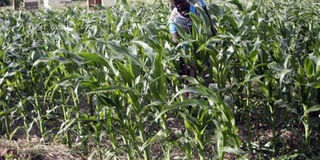Farming God’s way pays off for group

Esther Kambanza in her maize farm in Meru where she uses the ‘God’s way’ practice. PHOTO | PHOEBE OKAL | NATION MEDIA GROUP
What you need to know:
- The agronomy practice is being promoted in the country by Care of Creation Kenya, an Anglican Development Services organisation, and Methodist Bio-Intensive Agriculture Training Centre. The institutions have been training farmers in Meru since 2012.
- According to Anglican Development Services coordinator in Maua Peter Maina, the organisation trained farmers in Tigania West and provided them with seeds and organic fertiliser and then prepared 10 meter by 10 meter demonstration plots
- The mulch helps in weed control, water retention, addition of vital minerals into the soil as well as regulating micro-organisms and soil warmth.
Driving along the Meru-Ruiri-Isiolo Road, there are expansive farms of maize and beans.
However, the crops planted recently in some of the farms are withering due to lack of rains.
Near the Mugae Shopping Centre, overlooking the upcoming Isiolo International Airport, several farms have been abandoned following last season’s crop failure.
Yet amidst this gloom and despair, patches of rich-green maize and beans can be seen from a distance, standing out like oases in a vast desert.
The plants on the farms in Buuri sub-county are bigger, taller and healthier. The crops belong to members of Wirigiro Self Help Group, who are farming using a concept that they believe is their saving grace.
The members farm the ‘God’s Way’, an innovative method that combines techniques of conservation agriculture like no-till and mulching, with biblical teachings.
SUPPRESS WEEDS
The agronomy practice is being promoted in the country by Care of Creation Kenya, an Anglican Development Services organisation, and Methodist Bio-Intensive Agriculture Training Centre. The institutions have been training farmers in Meru since 2012.
“The method avoids disturbance of soil by use of mulch to encourage growth of beneficial micro-organisms, conserves moisture, suppresses weeds, boosts soil fertility and controls erosion,” Methodist training center director Martin Gikunda explains.
According to Anglican Development Services coordinator in Maua Peter Maina, the organisation trained farmers in Tigania West and provided them with seeds and organic fertiliser and then prepared 10 meter by 10 meter demonstration plots
In ‘Farming God’s Way’, the land is not tilled. Weeds are uprooted before digging planting holes.
The undisturbed soil is then covered with mulch from organic crops. Immediately seedlings sprout from the soil, the mulch is partially removed to avoid straining the young seedlings.
“Once the seedlings grow to six inches above the soil, the farmer should restore the mulch. This method of farming is inspired by the forest ecosystem where leaves fall and cover the soil before decomposing. Forest soil has no weeds and it is very fertile due to the ability to replenish minerals naturally,” Maina explains.
The mulch helps in weed control, water retention, addition of vital minerals into the soil as well as regulating micro-organisms and soil warmth.
Mugae Primary school head teacher Gerald Mungania says the school adopted the method to grow maize on its two acres to compliment donations.
FOOD SECURITY
“By ‘Farming God’s way’, we cut on the amount of water enabling us to grow food all-year round.”
Janet Makena, a member of Wirigiro, says they learned as a group. “Each of us then managed to mulch small portions, which are now talk of the village. Even after the rains stopped for a week, the maize looks green and healthy yet the others are withering,” Makena says.
Besides soil conservation, this farming method significantly cuts costs as there is no ploughing orweeding. It also saves time creating opportunities for farmers to engage in other gainful economic activities.
“I used to spend more than Sh3,000 on weeding an acre, but now I do not have to weed the mulched portion of my land which means I can save a lot of money from five acres. Besides saving time and money, we also expect to have a bumper harvest,” says Cyrus Kinoti, a member of the group.
Farmers using the method are discouraged from burning plant remains. All organic waste should be spread in the farm.
“Our soil is sick due to years of tilling which has deprived it nutrients. Unless we revert to the way God designed the environment to revive itself, we cannot rescue our soils,” Muriuki observes.




